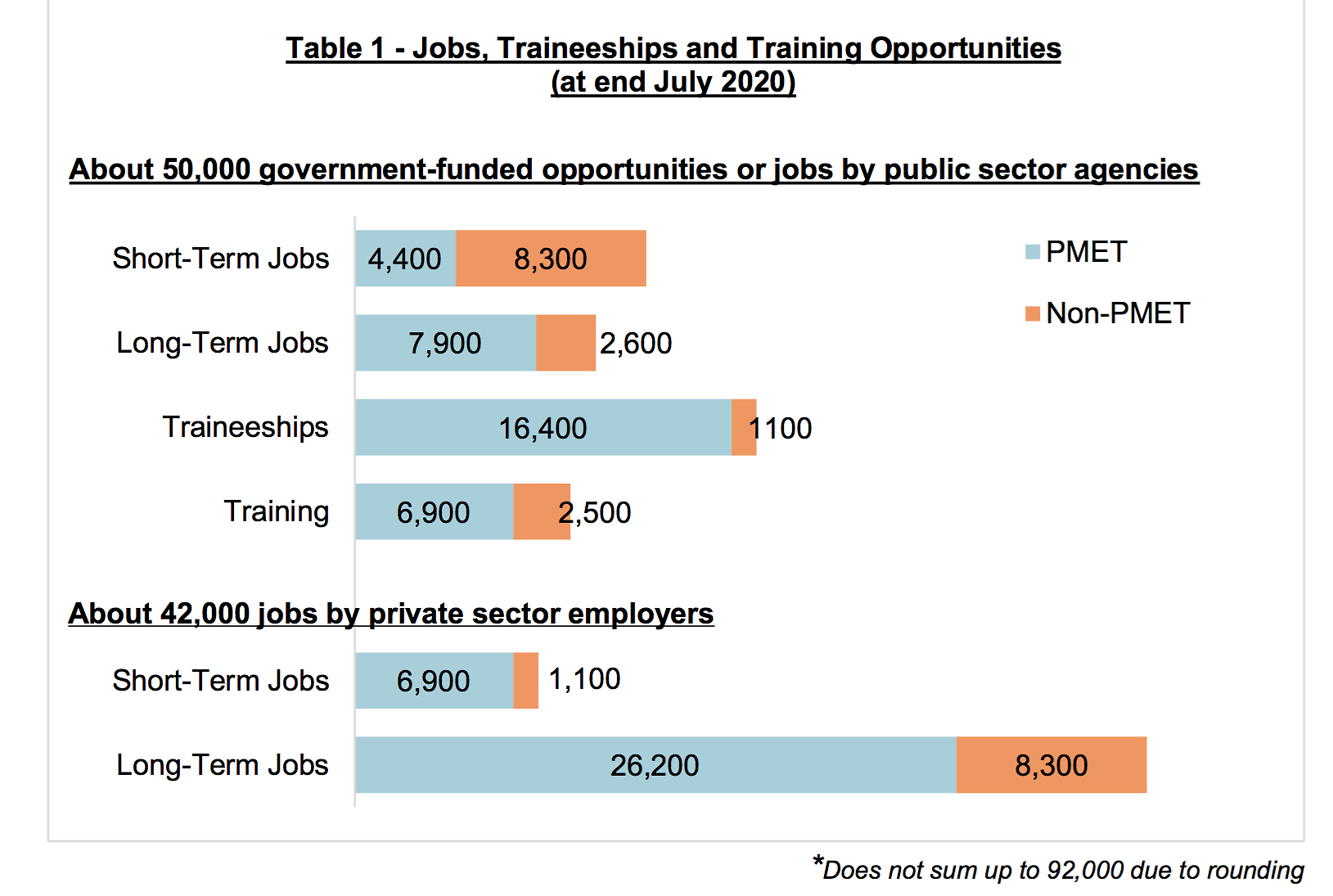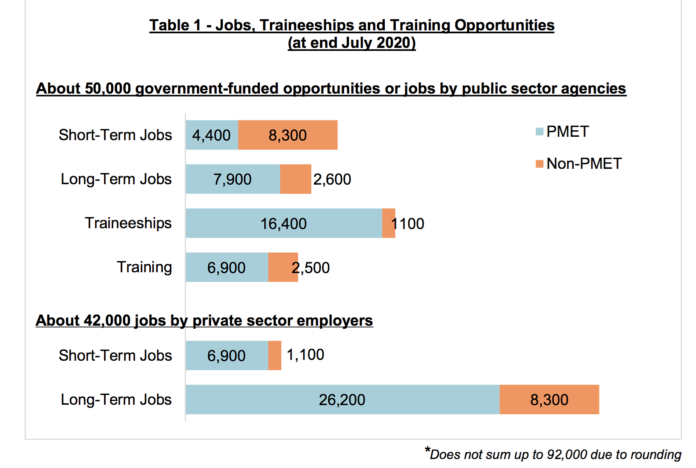SINGAPORE: About 24,000 jobseekers secured either jobs or work attachments under the SGUnited Jobs and Skills Package between March and end-July, Manpower Minister Josephine Teo said on Tuesday (Aug 11).
The majority of them were placed in short-term positions with a contract period of up to 12 months. Here is a breakdown:
- Short-term professional, manager, executive and technician (PMET) jobs: 5,200
- Short-term non-PMET jobs: 8,600
- Long-term PMET jobs: 4,600
- Long-term non-PMET jobs: 5,200
Announced in May during the fourth Budget, the SGUnited Jobs and Skills Package is a S$2 billion programme aimed at creating 100,000 job, attachment and training openings.
READ: Fortitude Budget – More than 40,000 jobs to be created as part of S$2b employment, training package
The 24,000 positions are part of a total of 92,000 that will be offered to job seekers, said Mrs Teo at the press conference on Tuesday, terming such roles “committed opportunities”.
About 50,000 of these positions are roles funded by the Government – including attachments hosted by private sector firms – or jobs offered by public sector agencies.
The rest are jobs offered by private sector employers that were listed on Singapore’s official jobs portal MyCareersFuture.sg.

Where the 92,000 openings go. (Photo: Ministry of Manpower’s Aug 11 Jobs Situation Report)
Mrs Teo said that though the labour market has softened – Singapore’s jobless rate rose to 2.9 per cent in the second quarter and is expected to climb in the months to come – there are still “pockets of hiring” in the economy.
For example, though employment in manufacturing is contracted, there are still companies in the electronic and precision engineering sub-sector that are looking for people.
“This may be because job seekers previously have not thought about certain jobs, certain industries that they are not familiar with or they feel that perhaps the level is not quite what they’re looking for,” Mrs Teo said, adding that she hopes potential employees will give these unfamiliar fields a go.
READ: ‘We are not returning to a pre-COVID-19 world’: Chan Chun Sing maps out ‘new path’ for Singapore
“They do allow you to gain relevant experience and hopefully when the company is in a position to hire into permanent positions, you are in a better place to access these opportunities.”
Workforce Singapore has also ramped up its outreach efforts by conducting 59 outreach and engagement activities in July, a press release from the Manpower Ministry said.
These include 11 walk-in interviews, with nearly 1,000 opportunities in sectors such as early childhood education, food and beverage, retail and logistics available. Slightly more than 300 job seekers applied for at least one job and more than 200 were shortlisted.
There were also 43 workshops and seminars organised in July.
These figures were part of the Manpower Ministry’s first Jobs Situation Report, which will be released subsequently on a weekly basis.
Future updates will cover different aspects so as to provide “a comprehensive look at what’s happening in the labour market”, said Mrs Teo.
These will include updates on retrenchments and cost-saving measures implemented by companies, as well as sectors that continue to hire or are emerging amid the rebuilding of the economy.
HELP FOR PMETS
Out of the 24,000 job placements, about 4 in 10 are at the PMET level, according to Mrs Teo. This is compared with the 7 in 10 ratio for the 92,000 curated roles.
This boils down to a “less straightforward” matching process for PMETs because employers are “looking for a better match” in terms of skills, experience and wage expectations, the minister said.
The authorities are very mindful that it could be “more challenging” for PMETs to be matched with new jobs as the sectors or roles that they have been displaced from will tend to be those that are not hiring anymore, she said. Hence, these PMETs will have to move to other occupations or industries.
“Sometimes, the skills that they have acquired have high degree of transferability and the top-up that is required for them to be effective in these new roles may not be such a big gap to fill,” said Mrs Teo, noting that existing career conversion programs will come in handy.
But some of these transition periods may take longer and individuals may have “to take a little bit more time to assess if these are the kinds of opportunities that they want to invest the time and effort in”, she noted.
Citing the example of a transition into the healthcare sector, which may require longer training, Mrs Teo said: “Working together with the healthcare providers, we are thinking of how we can enable the individuals to have short-term attachments so that they get the flavour of what is to be expected in this new career. And hopefully, this will encourage them to make that leap.”
Apart from this, companies are also being encouraged to offer traineeship opportunities under the SGUnited Traineeships Programme to mid-career, middle-aged job seekers, as part of efforts to help displaced PMETs transition into new jobs.
She noted that many companies remain “quite conservative” with their hiring.
“Even if they know that they want to strengthen the company’s human capital … and they want to take mid-career individuals onboard, but because they know that the mid-career individuals also have higher expectations, they are a little bit hesitant to make the job offer.”
“So the companies are now looking at this new avenue that is extended to them and … (we hope this) lets the individual – mid-career or middle-aged – to have a chance to be with the company. This gives the company a chance to also assess the individual.”
GOVERNMENT ASSISTANCE
Asked about calls from economists for the Jobs Support Scheme (JSS) to be extended so as to prevent further unemployment and business closures, Mrs Teo said the Government is “looking actively” into whether broad-based support continues to be needed.
“We are very mindful that in order to be able to focus our resources on helping the workers that are newly displaced, it’s best if … there is still a strong base of our workforce that … (remains) in employment. So that’s something that is actively being looked into,” she noted, adding that this will be addressed by Deputy Prime Minister Heng Swee Keat “quite soon”.
READ: Targeted extension of Jobs Support Scheme would help cope with COVID-19 losses: Analysts
Under the JSS, the Government co-funds between 25 per cent and 75 per cent of the first S$4,600 of gross monthly wages paid to each Singaporean or permanent resident employee.
The measure was introduced at the first Budget in February to help companies retain their employees as the COVID-19 pandemic was starting to hurt businesses. The scheme was revised in subsequent Budgets.
The JSS is set to expire after covering salaries in August, with payouts disbursed in October.
BOOKMARK THIS: Our comprehensive coverage of the coronavirus outbreak and its developments
Download our app or subscribe to our Telegram channel for the latest updates on the coronavirus outbreak: https://cna.asia/telegram





